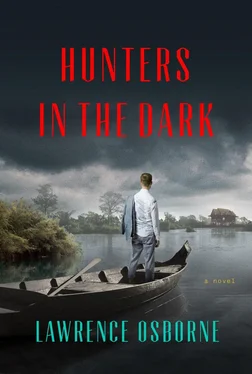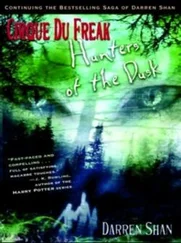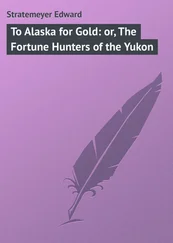It was one hot Sunday that Ouksa had heard about it in Battambang and he drove down to the river to seek that man out. The boatman was drunk in a run-down bar and he bought him a drink and took him down to the water so they could talk.
“Hey, brother,” he said to him, “can’t you keep your voice down a bit? Just let me buy you some drinks and talk to me. Just you and me.”
“What’s it to you, brother?”
“It’s something I should know about. I know that barang kid.”
“You do — how’s that?”
“I was his driver for a day.”
“That English kid?”
“Yeah, the shy one. So you took him downriver?”
“The boss paid me to take him.”
“The American?”
“Him. We carried him out and put him in the boat.”
“Funny business. Where’d you drop him off?”
“A place I know. He went into the city.”
“How’d you know that?”
The man looked at him with cold and vapid eyes.
“The drivers told me at the jetty. Where else could he go?”
Ouksa bought him a second Saeng. The man was tottering, the sun in his face, and flies danced around them and shimmered against the water.
“Was he able to walk?” Ouksa said.
“He walked. He woke up during the ride.”
“What was it all about, brother?”
The man laughed. “How the fuck should I know?”
“He must have said something.”
“The American didn’t say anything. The English kid asked for his bag on the boat, but it wasn’t there.”
“A bag?”
“Yeah, his bag was missing.”
Ouksa bit his lip and looked down at the river.
“Did you come back to the American’s jetty after?”
“I did. The American and his girl were there. They were getting into their car.”
“A sweet job for you.”
“I’ll say. I didn’t have to kill anyone.”
The joke went nowhere.
“No,” Ouksa said grimly. “You didn’t have to kill anyone.” Then he said, “What’s your name, brother?”
“Thy.”
He walked back to his taxi and thought. It was clear enough to a clear mind. The man had followed him and pestered him for another drink so he gave him a buck and got into his taxi. He then drove off angrily, feeling that he had missed out on something. He had gotten to the two grand first but he had let it slip through his fingers like a fool. The American had not been so stupid. Eagle eyes, that one. He remembered the blue eyes that had tracked him, dismissed him and yet knew everything about him.
For days he lay by the river in the afternoons watching the boats go by. When it rained he lay on the backseat of his car and slept and when the evening was dry he went to a bar he knew and sat there impassively slinging back brandy shots and following the girls with his eyes.
He trawled the temples looking for soft touches, preferably elderly Europeans always ready to overpay. Campy blond girls who might be up for some extra fun. They never were. They didn’t come here for sex. And the sights were not visited much in the rainy season.
One day that week he had a Buddhist group from Vancouver who wanted to see Wat Sampeau and he took four of them there for an exorbitant price. He walked up with them to the sinister caves and took them down to see the carved Buddha where the dead were remembered and the shrines sitting on top of their spurs of rock with prayer ribbons fluttering in lines all around them. He didn’t like going there, or any haunted place, but the money was good. It was not, however, enough for him or his crippled wife. She could no longer work and for six months he had been driving the roads every day to make enough money to keep them sane. What use had the prayer flags for her? She had smashed her leg in a metal workshop.
The Buddhists would never understand such a thought, though they would certainly empathize with it. So he walked with them down the winding path that looked over a sea of dark green jungle with the loudspeakers of the wat by the road echoing up, and he talked amiably about all the temples he knew while his mind raced ahead into a dark and sinister future that would certainly be his. His wife’s smashed leg seemed insignificant next to the memorials to the thousands murdered on top of Wat Sampeau but he had not even been born in that period and it didn’t mean as much to him as it apparently did to the rich Canadians. They gave him a handsome tip for the day and bought his wife a pair of new shoes which she could hardly wear.
He thought about her asleep in their house at the edge of the fields as he waited in the bend of the road below the mountain where Moonrise stood. It was still raining and he turned off the car’s lights and waited with all the patience of which he was remarkably capable. He had called at eleven and told her to go to sleep, he was on a job for wealthy Chinese. She knew he was often with the Chinese, even though he loathed them. They were essential to his fortunes but they disgusted him.
Often, in fact, his clients filled him with a bottomless and directionless contempt. Especially the gamblers who rolled around Pailin while he waited for them for hours outside casinos and karaoke joints. Those parasites who thought his country was a genocide museum and a playground but nothing too serious. Who behaved as if he didn’t exist. He hated the way they threw money at him, with a flick of the wrist, as if he was an extra in their shimmery theater of lust and poker. Well, I exist all right, he said aloud as he sat behind the wheel of his taxi. I exist a lot . A car’s lights had appeared.
It was the Saber, which had reached the bottom of the mountain track and had nosed its way onto the main road. It hesitated and Ouksa heard the engine tick as the driver let it idle and dithered. Finally it turned toward Pailin on that lightless road and when it did so he saw the red taillights move off at a fair clip. He started his own engine but left the lights and followed. The rain helped him, because nothing could be seen in a rearview mirror without lights.
Simon drove at about fifty toward the east and Sothea soon fell asleep on his shoulder. They had the radio on and it was old Khmer pop from the seventies. Ouksa followed a quarter of a mile behind and when the Saber slowed he slowed as well, judging the distance expertly. The Saber was slowing again as if it was about to stop. Simon indeed was looking for a spot to pull over so he could pee and take a breather. Sothea had woken and he told her he was going to stop for a few minutes and they could clear their heads. She rubbed her eyes and felt with a quiet instinct that something was behind them and turned to look through the muddy rear window. Seeing nothing, she was half reassured. They then pulled over into a muddy verge, beyond which stood tall sugarcane. They turned off the engine but kept the lights on and got out into the rain, which had lessened, and walked to the edge of the cane, which trembled gently in the rain. She went on a little ahead and entered the glade of cane that reached above her head. She was exhausted but she needed to pee as well and her head was still spinning from the dope. It was, from Ouksa’s perspective, the moment of opportunity.
He had stopped his own car down the road and crept along the hard shoulder until he was behind the parked Saber. He had taken out of his trunk a baseball bat he always kept there. Every driver in that semi-lawless place had a weapon of some kind and his was a mild one. He saw the white man standing with his back to the road at the edge of the sugarcane and the girl slipping into the thicket ahead of him. He crept up to the car and hid behind it and then moved silently around it — still covered by darkness — and like a classical dancer aimed his pitch with the bat with an elegance that surprised himself.
Читать дальше












